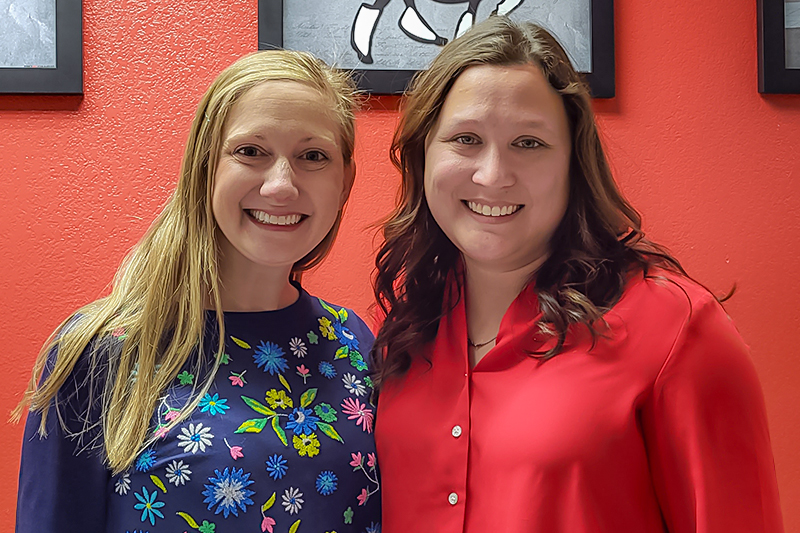Breadcrumb
Alumna Partners with UCM to Provide Collaboration Training in Area of Domestic and Sexual Violence Prevention
By Jeff Murphy, October 18, 2023

Molly Lindner, left, communications assistant with the Prevention and Implementation
Team at Missouri Partners in Prevention (MoPip), and University of Central Missouri
alumna Sammie Jurado, '15, partnership development coordinator for the Missouri Coalition
Against Domestic and Sexual Violence (MOCADSV), recently conducted a training program
at UCM.
WARRENSBURG, MO – When it comes to domestic and sexual violence prevention, one of
the strongest assets any organization has is the connections it establishes with partners
who are committed to the same goals. This was the focus of a presentation made by
a University of Central Missouri alumna who returned to her alma mater to co-lead
a day-long training session for members of colleges, universities and public health
agencies throughout west central Missouri.
The program titled “Asset Mapping to Increase Effective Collaboration Training” took
place in the Elliott Student Union on Oct. 9. It was conducted by Sammie Jurado, who
graduated from UCM in 2015 with a double major in Criminal Justice and Psychology,
and currently serves as a Partnership Development Coordinator for the Missouri Coalition
Against Domestic and Sexual Violence (MOCADSV). She collaborated on the training program
with Molly Lindner, communications assistant with the Prevention and Implementation
Team at Missouri Partners in Prevention (MoPip). Based at the University of Missouri-Columbia,
MoPip is the state's higher education substance misuse consoritum dedicated to creating/maintaining
health and safe campus environments.
Both prevention professionals will conduct a similar program in Hillsboro, Missouri
later this month for organizations that partner with MoPip and MOCADSV. Through their
work they hope to promote the value of access, opportunity and community in the establishment
of prevention strategies.
“UCM was chosen as one of two sites for this training partly based on our strong history
of commitment to collaborative, evidence-informed prevention efforts,” said Amy Kiger,
director of Campus Community Health. She also noted UCM has excellent facilities
for such a meeting.
During the training program, Jurado and Lindner demonstrated how to utilize the Power
Mapping Framework that was developed by the American Association of University Women
(AAUW). This is a tool for engagement that analyzes relationships and helps develop
a strategy for change. It informs participants how to create a visual map of relationships
they can form between people, organizations, and institutions and to understand the
value and outcomes of these relationships. By doing so, they can identify avenues
of influence that contribute to building prevention programs and policy development.
Additionally, the presenters introduced their audience at UCM to an interactive tool
known as the Collaboration Multiplier. This was developed by the Prevention Institute,
a national non-profit organization with offices in four U.S. cities that is focused
on cutting edge strategy, research and analysis to address pressing health and safety
issues, and is designed to strengthen collaborative efforts across diverse fields.
A multi-field approach is vital for addressing complex social challenges, so this
tool helps guide organizations through a collaborative discussion about activities
that can help them accomplish a common goal. It also helps partners gain a better
understanding of other collaborating institutions’ perspectives and potential contributions
in order to leverage resources and expertise.
Six colleges and universities were represented at the recent training program, but
the invitation list was much more extensive. Jurado and Lindner stressed the value
of inviting area health agencies to attend because of their significant role in prevention.
MoPip works closely with the Missouri Department of Health and Senior Services Office
on Women’s Health, which was the main financial contributor to the development of
the multi-level Engage Program, known at UCM as Care to Act. Engage provides a strategy
for bystander intervention by promoting community connection and a sense of belonging.
The training program that Lindner and Jurado presented at UCM grew out of the collaborative
efforts that made Engage possible.
“That’s where this stems from, because with fewer resources, it’s important to know
who you can connect with,” Lindner said.
Colleges and universities are vital to prevention efforts, but to make a positive
difference where students are concerned, connections must extend past institutional
boundaries because “students don’t just exist on campus,” according to Jurado. “Your
students are part of your community and the community is part of your students.”
She added that she was pleased to return to her alma mater to share information about
violence prevention and building connections, particularly knowing there are individuals
who are dedicated to this issue.
“I’m very proud of UCM for being as involved as they are,” said Jurado, whose previous
experience also includes working at a shelter for abused adults and at a legal aid
agency.
When asked what she hopes participants took away from the training session, Jurado
noted, “I want people to be able to think about partners that are not already ingrained
in the work that they are doing. Prevention work isn’t just about me talking about
prevention or me spreading awareness. A lot of it is having partnerships with people
who have influence where students and the people are in the community.”








